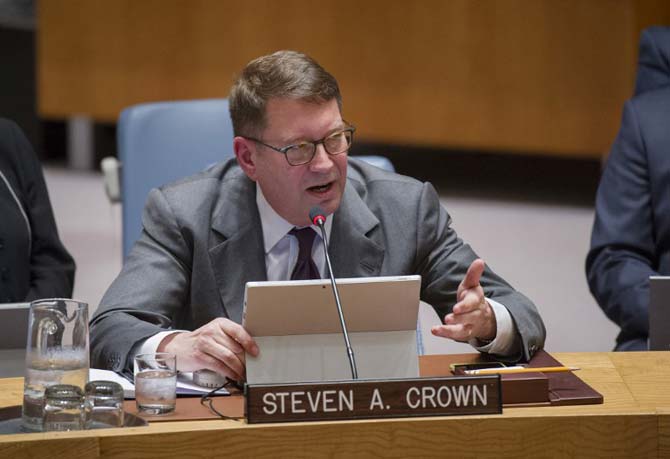Microsoft said on Wednesday that there is no silver bullet that will stop terrorist use of the internet

Steven A. Crown, Vice President and Deputy General Counsel of Microsoft Corporation, addresses the UN Security Council open debate on "Threats to international peace and security caused by terrorist acts: Countering the narratives and ideologies of terror
United Nations: Microsoft said on Wednesday that there is no silver bullet that will stop terrorist use of the internet.
ADVERTISEMENT
Steven Crown, vice president of Microsoft Corporation, told the UN Security Council that for the internet industry, the challenge of terrorist propaganda and communication is daunting.

Steven A. Crown, Vice President and Deputy General Counsel of Microsoft Corporation, addresses the UN Security Council open debate on "Threats to international peace and security caused by terrorist acts: Countering the narratives and ideologies of terrorism" at the UN in New York. AFP PHOTO
"If there were an elegant solution, industry would have adopted it," said Crown at a Security Council debate on counter-terrorism. "But there is no single answer; there is no silver bullet that will stop terrorist use of the internet."
He said another unfortunate truth is that there is no universally accepted definition of terrorism or extremism, neither at the international level nor at the regional level, Xinhua reported.
According to statistics provided by Crown, within 15 minutes of the Paris attacks last year, there were 7,500 tweets; within two weeks, there were 1 million views of videos on the internet praising the attacks.
The Security Council requested on Wednesday a "comprehensive international framework" to counter propaganda by terrorist groups to motivate others to commit terrorist acts.
In a presidential statement adopted here, the Security Council noted the urgent need to understand how these groups, such as the Islamic State and Al Qaeda, recruit others and to develop a counter narrative campaign to amplify active denouncers of these groups.
The council asked its Counter-Terrorism Committee to present a proposal on the framework with recommended guidelines and good practices by April 30, 2017.
At the meeting, UN Deputy Secretary General Jan Eliasson also called for more of study and research on how violent extremists are using the internet and social media.
He noted the need to listen to affected communities, engage at the grassroots level, partner with faith leaders, women and young people to respond to extremism at local level.
 Subscribe today by clicking the link and stay updated with the latest news!" Click here!
Subscribe today by clicking the link and stay updated with the latest news!" Click here!






